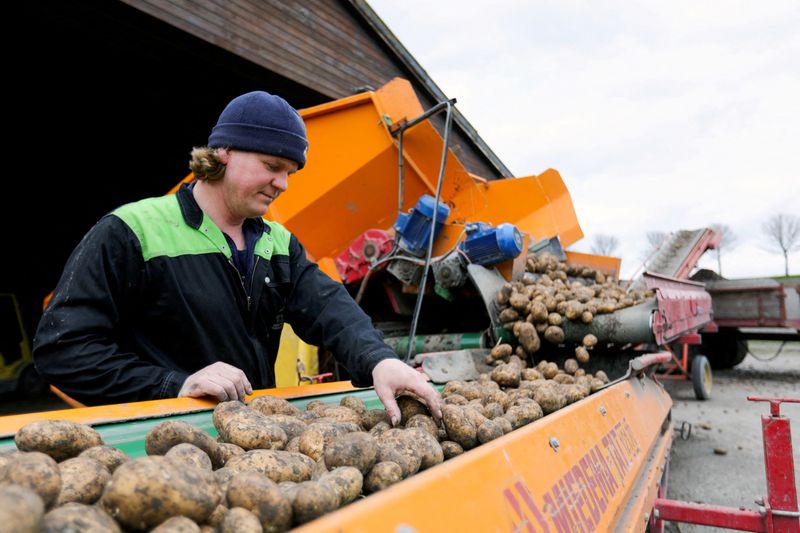The economist Achim Truger does not see a new inflation regime coming up despite the recent sharp rise in prices. It was foreseeable that inflation would rise due to rising energy prices and corona-related supply bottlenecks.
“Also, the higher inflation will last longer than originally expected because the disruptions last longer. But I don’t see any reason to worry,” said Truger in an interview with the Handelsblatt. “In the course of this year, inflation should fall again.” Some special effects such as the VAT, which was raised again after a temporary reduction, would no longer apply in 2022. There are also no broad wage increases in sight that would further drive inflation. In the debate about building up a climate reserve from unused corona debts, Truger called on the federal government to adjust its plans. “If you define three or four spending blocks with upper limits and make it clear to what extent this serves to overcome the consequences of the corona virus, that would certainly make the climate reserve even more constitutional,” said Truger.
Read the full interview here:
Mr Truger, the inflation rate climbed to 5.3 percent in December. Do we have to worry?
That inflation would rise , was foreseeable due to rising energy prices and corona-related delivery bottlenecks. However, it was not foreseeable that prices would rise so sharply. Also, the higher inflation will last longer than originally expected because the disruptions last longer. But I don’t see any reason to worry about that. Inflation should start to fall again later this year.
notified by email.
What makes you so sure? The Bundesbank expects even higher inflation this year than in the past.
Yes, on average over the year. The Bundesbank perhaps wanted to send out a signal with their forecast that the dangers of inflation should not be underestimated. You shouldn’t. However, the vast majority of forecasts assume that inflation rates will fall again over the course of the year as the disruptive factors and special effects such as the resumption of the temporarily reduced VAT subside. The decisive factor is whether wages rise as a result of higher inflation, whereupon prices rise again, i.e. we get caught in a wage-price spiral. At the moment there are no signs of such a spiral, the foreseeable wage increases are moderate. The US Federal Reserve, however, is tightening monetary policy much more than the European Central Bank.
The situation in the USA is completely different. Inflation is higher, financial policy more expansive, the economy more dynamic. In this situation, the US Federal Reserve can tighten monetary policy more. In Europe, however, the upswing is being pushed backwards by the omicron wave. I find it entirely appropriate that the ECB initially indicated a more cautious exit from the loose monetary policy. Is the ECB pursuing a more cautious policy out of consideration for southern Europe, because some euro countries could get into financing problems if the ECB no longer massively finances their debts?
I do not think so. The ECB is trying to achieve its inflation target with its bond purchases. If you look at the level of debt and the interest burden of southern European countries, they can certainly tolerate slightly higher interest rates. And if, once the pandemic is over, the recovery takes place as hoped, their debt levels should decrease, even with higher interest rates. With Joachim Nagel there is a new Bundesbank President . A good choice?
I would also like to have a wife at the head of the Bundesbank, but I have no doubt that Joachim Nagel will do a good job. Many citizens expect the Bundesbank President to get inflation under control. How is Nagel supposed to do that within the Governing Council, where the Bundesbank was last isolated?
The Bundesbank is no longer responsible for monetary policy, but of course Joachim Nagel can influence the Governing Council. And of course the Bundesbank can make a contribution, for example the very well-positioned research department with its investigations. With the latest inflation forecasts, everyone was completely wrong: ECB, Bundesbank, economists. Why?
We are all experiencing for the first and hopefully only time in our lives such a pandemic. It was difficult to foresee that the supply chains would not only jerk, but would get stuck. Neither are the swings in the oil price. The recent corona wave is something else. I would self-critically admit that many, including the German Council of Economic Experts, did not warn about this in good time. As in the previous year, we could have estimated the effects. However, the economic picture that was drawn in the previous year is still intact: the recovery is in place, but is shifting. So no further measures to support the economy are necessary?
The most important thing is still the support for the affected companies and employees. The new federal government has also quickly extended the Corona aid. What should the government do if further action is needed?
Many investment measures from the coalition agreement will support the recovery anyway. Above all, fiscal policy must not embark on a consolidation course too early and must be ready, if necessary, to give it another boost. The traffic light government wants to “dare a new beginning”. Is your financial policy a new departure?
Judging by how the three election programs were different, it is noteworthy that the coalition agreement gives signals of departure with a clear direction in terms of financial policy. The traffic light has pragmatically agreed on a whole bunch of instruments to be able to invest more in climate protection, infrastructure and housing. So you are now a fan of the new Federal Finance Minister Christian Lindner (FDP), after you passionately campaigned against his tax cut plans?
(laughs). I really like that Mr. Lindner described the Federal Ministry of Finance as an enabling ministry. This coincides with my ideas of an enabling science. For a long time, the Council of Experts played the role of admonisher and warner. However, science must not only say what should not be, but also say pragmatically what is possible. Lindner apparently sees his role similarly. Prevent less, do more. But can one seriously speak of a new beginning if the blockade policy of the grand coalition is continued in tax policy and simply nothing happens?
The tax cut plans of the FDP with a volume of 90 billion euros annually were simply crazy. Not even the 30 billion that the Union demanded was realistic. I would have liked to have had a slightly higher burden on upper incomes in order to relieve lower incomes in return. Too bad that wasn’t politically feasible. Achim Truger
The federal government is screwing properly on the debt brake.
Well, screwed? She uses the legal leeway that the debt brake leaves her. The planned build-up of a climate reserve from unused corona debts don’t you think vulnerable?
Apparently he is being attacked, some constitutional lawyers have already spoken out critically. In order to justify the build-up, there needs to be a causal connection between the corona crisis and the expenditure that one wants to make from the reserve. It’s challenging, but doable. For example, investments were omitted due to Corona, which inhibits future growth. There is also higher social spending for a longer period of time. The government can react to the criticism again. In what way?
The traffic light could sharpen the justification for the climate reserve again . Defining all planned expenditures down to the last detail would be too binding for future legislation. But the reserve must not be completely vague. If you define three or four spending blocks with upper limits and make it clear to what extent this serves to overcome the consequences of the corona, that would certainly make the climate reserve even more constitutional. The reserve is not the only way the traffic light wants to bypass the debt brake. Aren’t you afraid that such a policy, which interprets the rules more laxly, could find imitators in Europe?
I think all this talk that spending more is always a dam burst or the road to bondage is completely misguided. It’s about measures that account for 0.5 or one percent of gross domestic product. You can’t pretend that we’re unleashing an unstoppable avalanche of debt. We urgently need to objectify the debate. And for Europe it is not the German debt brake that is decisive anyway, but the EU fiscal rules. Which are also to be relaxed at the instigation of some euro countries.
Not only at the instigation of some euro countries. The International Monetary Fund, the European bailout fund, actually everyone is in favor of reform. With debt ratios of over 100 percent in the euro area, a speedy return to the Maastricht limit of a maximum of 60 percent public debt is obsolete. What do you suggest? Exempt green investments from the debt rules?
Yes, that is a possibility. More leeway for investments and economic stabilization in the EU debt rules. One could also create an EU climate fund analogous to the Corona reconstruction fund, the funds of which the EU Commission finances through debt. We have to get the climate investments right. With a climate fund, the question of financing could be permanently solved for many countries, including Germany. In any case, it won’t work without reforms.More: ECB Director Schnabel: Energy prices may require anti-inflationary action
Note: This article have been indexed to our site. We do not claim legitimacy, ownership or copyright of any of the content above. To see the article at original source Click Here












